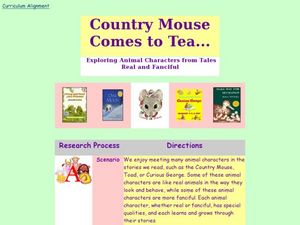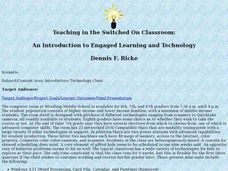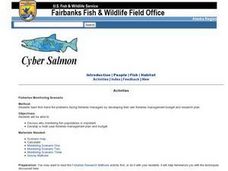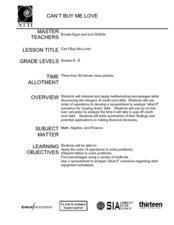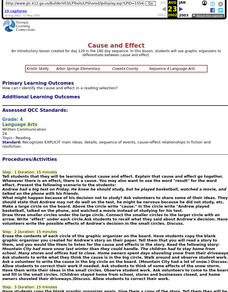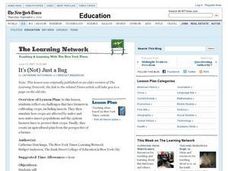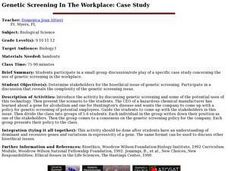Curated OER
Science Fiction
Young scholars write a science fiction story. In this science fiction lesson, students read selections of science fiction and compare them to supernatural stories from the Bible. Young scholars identify themes and discuss...
Curated OER
Election of 1860
Young scholars determine how the presidential election of 1860 led to the American Civil War. In this election of 1860 lesson, students discover details regarding the election and hold their own mock debate and election. Young scholars...
Curated OER
Country Mouse Comes to Tea: Exploring Animal Characters from Tales Real and Fanciful
Students study animal characters. In this language arts lesson, students analyze animal characters from a variety of books and create a story using animal characters.
Curated OER
Government Lesson Plan: Lesson Plan 7
Students examine the impact of Franklin Roosevelt's executive order on Japanese-Americans. They discuss Presidential executive orders, read a handout, answer discussion questions, and write a letter to President Roosevelt.
Curated OER
Using VNTR Analysis to Identify Guilt at a Crime Scene
Students collect DNA from cheek cells. They compare and contrast the processes of DNA replication and PCR. They discuss how this information can be used to determine guilt at crime scenes.
Curated OER
Topographic Map Unit Plan
Pupils examine topographic maps and discover how to decipher contour intervals, use contour lines and apply information to complete a topographic map lab. Working in groups, they identify the scale of the map, latitude and longitude,...
Curated OER
Teaching in the Swithched On Classroom
Learners engage in activities to help them develop computer skills and other various problem solving methods. They also work collaboratively, and apply technology in an ethical way.
Curated OER
Resources
Students describe renewable energy resources and identify the main examples. They compare pros and cons of different energy resources. Students comprehend that fossilfuels were formed million of years ago. They summarize information...
Curated OER
Mushrooms Can Save the World
Students use mushrooms to solve problems. In this environmental lesson, students study how fungi have been used to combat environmental problems. Students design strategies that employ mushrooms to combat other environmental challenges.
Curated OER
Participation in civic life
Students investigate the political activism of Chinese in Australia - from the protests against discrimination in the late nineteenth and early twentieth centuries to the participation of Chinese Australians in all levels of government...
Curated OER
Snack Time
Students brainstorm what they would like for their favorite snack. They take pictures of those snacks and place them in paper bags, one labeled "Yes" and one labeled "No". When those snacks in the "Yes" bag are called they are to color...
Curated OER
Fairfax County Board of Supervisors' Meeting
Students examine the role of the Board of Supervisors in Fairfax County, Virginia. In groups, they research their responsibilities to the community and role play in their own Board meeting. To end the lesson, they discuss how it can...
Curated OER
Mandatory Sentencing
Students review mandatory sentencing and brainstorm opinions based on Measure 11. They work in groups, hear case study then determine significan facts, the correct charge and the sentencing for the case. They discuss actual outcomes of...
Curated OER
Utilizing Individual Resources in Everyday Problem Solving
Students utilize their understanding of individual resources in solving practical, everyday problems that might arise in the workplace and/or in their family and home.
Curated OER
Fisheries Monitoring
Students discuss why monitoring fish populations is important. They develop a multi-year fisheries management plan and budget.
Curated OER
Cannot Buy Me Love
Students investigate the concepts that are related to finance and how it is used in the world. They take part in activities that are focused around the use of a spreadsheet while using a T-chart to simulate a ledger of credits and debits.
Curated OER
Cause and Effect
Fourth graders use graphic organizers to differentiate between cause and effect. They read a story independently and write the cause and effects in the graphic organizer.
Curated OER
One Survivor Remembers: Twenty Pounds
Students gain an understanding of the plight of the Jews during the Holocaust. They explain the dangers of hate and extremism.
Curated OER
On the Playground
Students comprehend various situations by addressing real life dilemmas. They work together and collaborate to set goals and prioritize their view. Students talk about their options in solving the problem in an effective manner.
Curated OER
It's (Not) Just a Bug
Students explore, examine and reflect on challenges facing produce farmers. They study about invasive species and how they affect the agricultural industry by reading and discussing the article "Tiny but Hungry, Moth May Peril California...
Curated OER
Philantrophy of the Founding Fathers -- Alive and Well Today
Pupils discuss the role that individuals have in contributing to society. They develop alternative solutions to problems in their area. They write a paper about what they have discovered.
Curated OER
Genetic Screening In The Workplace: Case Study
Students participate in a small group discussion/role play of a specific case study concerning the use of genetic screening in the workplace.
Curated OER
I Heard It on the Radio
Students develop a portfolio of information of contemporary musicians or individuals from the music industry.
Curated OER
Current Issues/Lesson Plan 1: What Matters To You
Students examine the process of the Canadian parliamentary system. They identify current events, read newspaper articles, and write letters to the Editor and Editorial section.




